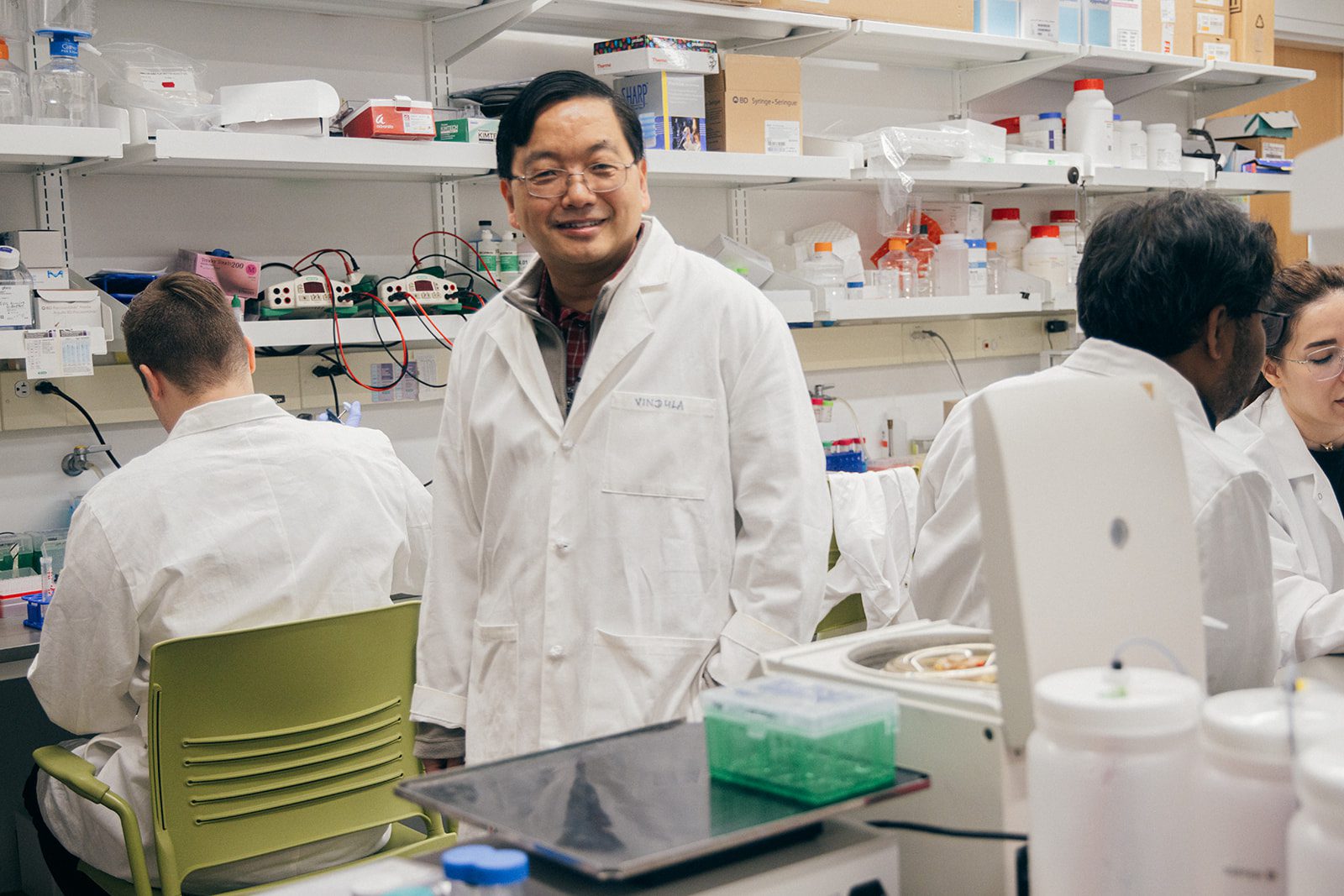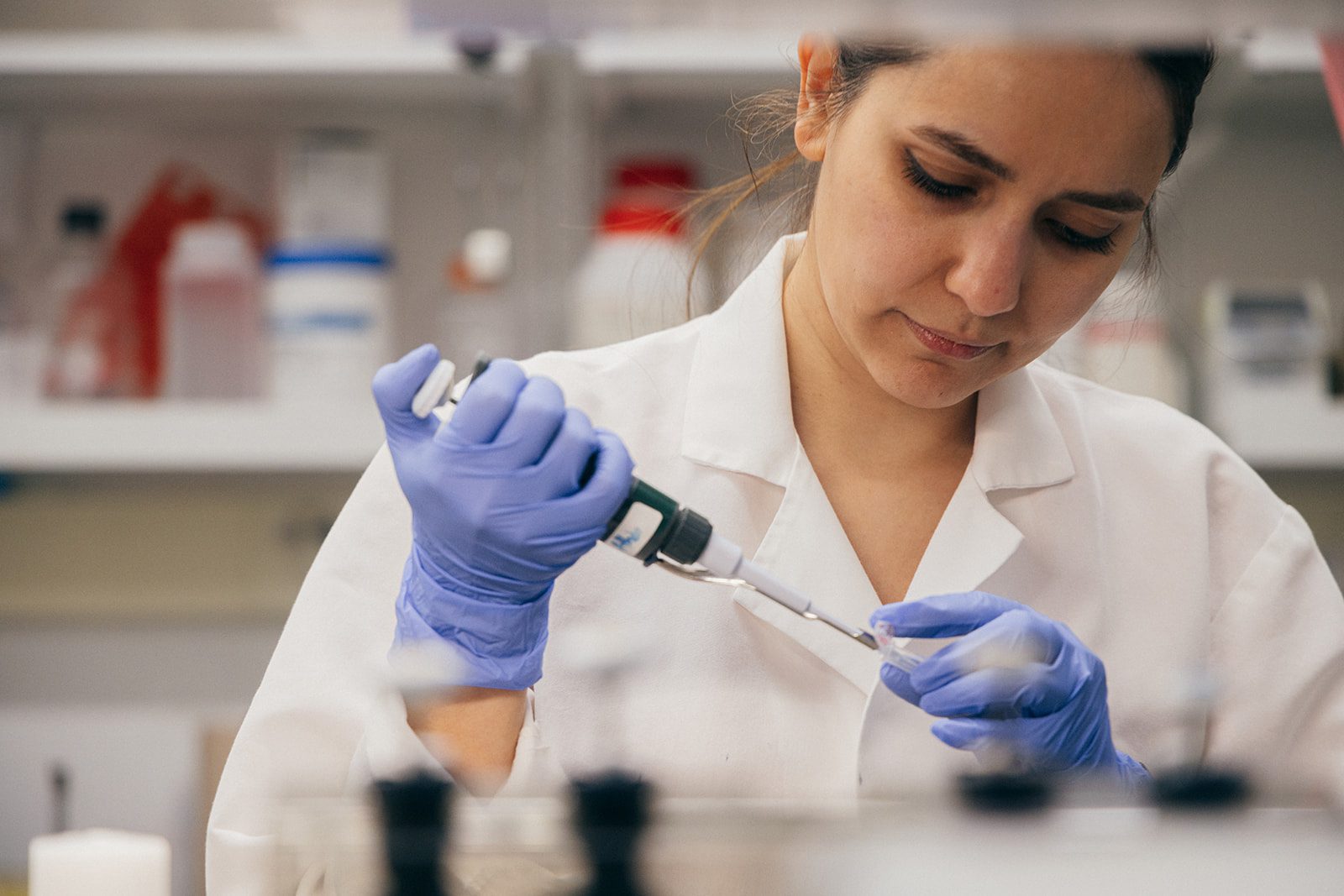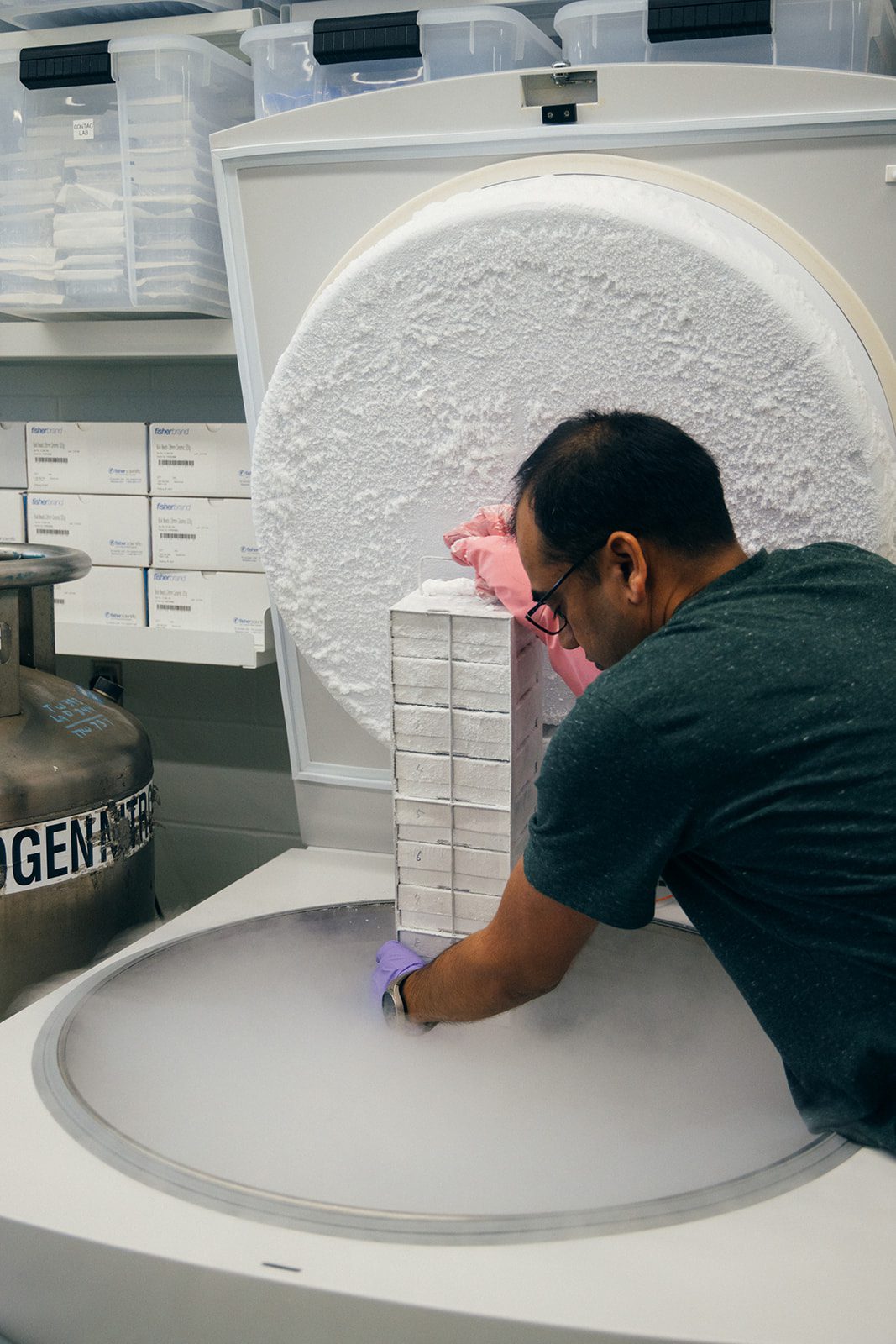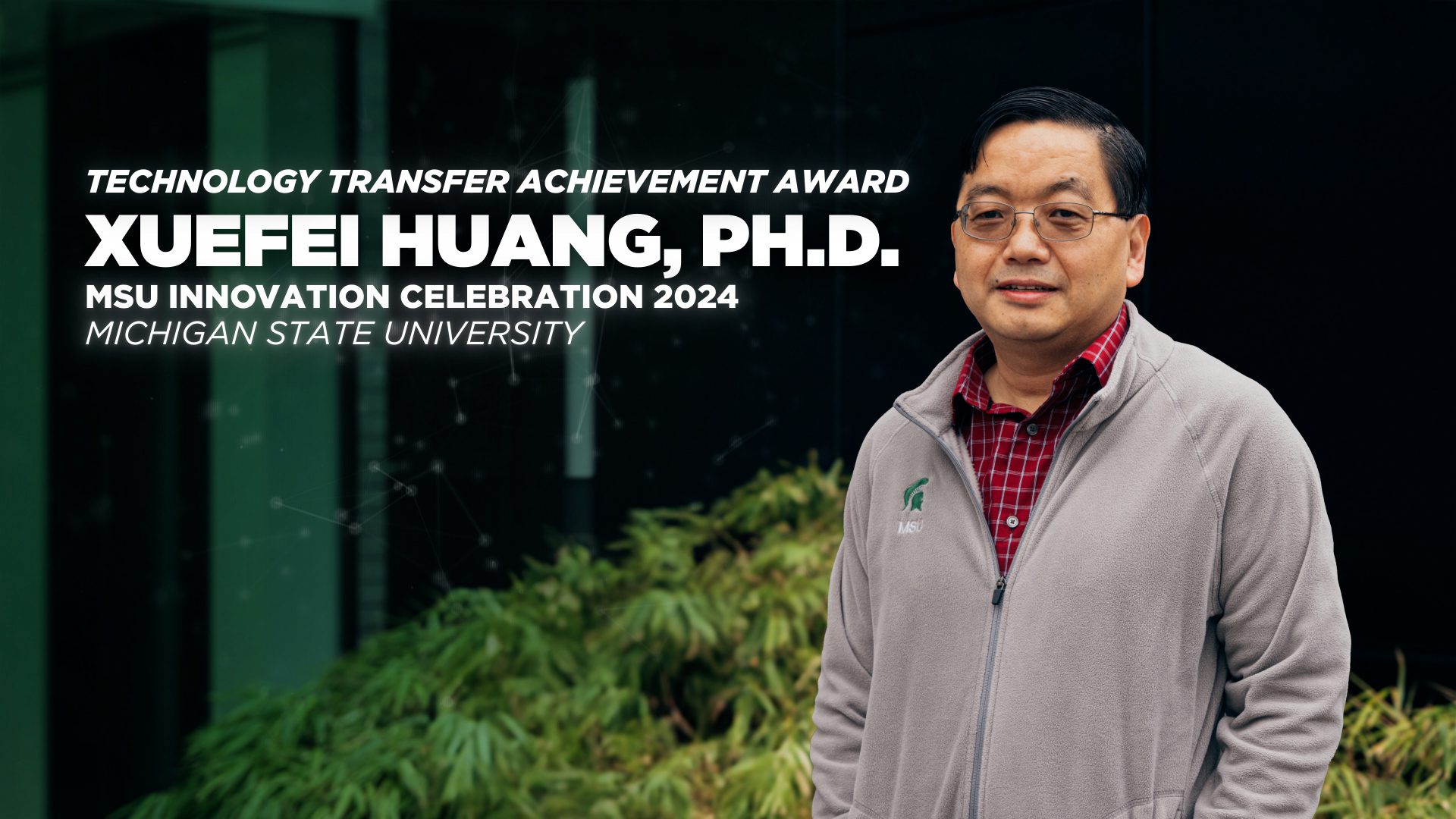East Lansing, MI – Xuefei Huang’s lifelong research has been focused on building tools to recognize and target carbohydrates. Not the carbohydrates commonly found in our food, clothing, paper, etc., but carbohydrates found on cell surfaces. “Human cells, bacteria surfaces, some virus surfaces; they all have carbohydrates,” says Huang. “What we’re interested in is developing immune responses against what we call ‘bad carbs,’ which are carbohydrates associated with cancer or bacterium or viruses. We want to use the immune response to help protect us from cancer development, to treat cancer, or prevent bacterial and virus infection.”
According to Huang, the challenge with this approach has been that carbohydrates themselves generate very little immune response. To overcome this, he began looking at carrier systems that would deliver carbohydrate antigens to immune systems.
 The result of his more than 20 years of research is a protein, a soccer-ball-shaped nanoparticle called bacteriophage Qβ, or Q Beta.
The result of his more than 20 years of research is a protein, a soccer-ball-shaped nanoparticle called bacteriophage Qβ, or Q Beta.
This groundbreaking technology is not a drug but a vehicle for the delivery of antigens to the immune system to boost the immune response against “bad” carbohydrates. Q Beta is differentiated by a combination of density and a highly ordered pattern of conjugation sites, which allows the delivery of a greater number of antigens to the body’s immune system, producing a more significant immune response.
This exciting new direction for the development of anti-cancer and other vaccines has earned Huang this year’s Technology Transfer Achievement award.
“In 2018 we disclosed to MSU Technologies that we have this technology in laboratory testing that looks very promising,” Huang says. “Then the MSU Innovation Center talked to me saying the technology looked encouraging and asked, ‘Are you interested in starting a company?’”
 Huang laughs when he recalls his initial response. “I said, ‘No, no!’ because I had no clue. I have no training in entrepreneurship. I didn’t know how to start a company. I didn’t know what to do with a company!” The Innovation Center assured Huang that this would not be a problem. “They told me, ‘We can help you,’ and they provided all the information I needed to move forward toward commercializing Q Beta. They just sort of held my hand and guided me through the steps. That’s how our company, Iaso Therapeutics, got started.”
Huang laughs when he recalls his initial response. “I said, ‘No, no!’ because I had no clue. I have no training in entrepreneurship. I didn’t know how to start a company. I didn’t know what to do with a company!” The Innovation Center assured Huang that this would not be a problem. “They told me, ‘We can help you,’ and they provided all the information I needed to move forward toward commercializing Q Beta. They just sort of held my hand and guided me through the steps. That’s how our company, Iaso Therapeutics, got started.”
Huang continues, “Our company’s goal is to commercialize and translate the technology developed in the lab, the licensed technology from MSU, and to develop it further into a commercial product that the FDA will approve so that we can use it to treat diseases, reduce pain, and improve human health.”
 MSU Technologies, MSU’s technology transfer office, is charged with moving technologies from the lab to the marketplace. Technology Manager Anupam Jhingran, Ph.D., assisted with the various steps along this path. MSUT facilitated the agreements between the University and Iaso Therapeutics to license the technology and filed and secured patents covering composition and applications of Q Beta technology in the U.S. and in key countries, protecting their intellectual property globally. MSUT joined forces with Spartan Innovations and Business Connect, the other two units within the MSU Innovation Center, and provided support for Huang to secure government Small Business Innovation Research (SBIR) grants and other funding that helped support research to move the technology forward.
MSU Technologies, MSU’s technology transfer office, is charged with moving technologies from the lab to the marketplace. Technology Manager Anupam Jhingran, Ph.D., assisted with the various steps along this path. MSUT facilitated the agreements between the University and Iaso Therapeutics to license the technology and filed and secured patents covering composition and applications of Q Beta technology in the U.S. and in key countries, protecting their intellectual property globally. MSUT joined forces with Spartan Innovations and Business Connect, the other two units within the MSU Innovation Center, and provided support for Huang to secure government Small Business Innovation Research (SBIR) grants and other funding that helped support research to move the technology forward.
“Dr. Huang is a prolific inventor, and I have enjoyed working with him,” says Jhingran. “It’s been fascinating to see how his Q Beta technologies have evolved over the years.”
“When I started, I was working on the patents and agreements related to Q Beta applications in cancer vaccines, and now he has demonstrated the technology can be used for infectious diseases, opioid addiction, and in other applications. I think Q Beta shows a lot of promise, and Dr. Huang is set to unlock its full potential. I look forward to continuing to support him as he works towards that goal.”
What does the award mean to Huang and his team? “It is exciting,” he says. “You know, I’m a basic scientist. We do a lot of basic science in the lab. So, it’s gratifying to be recognized for the translational aspects of the innovation as we strive to integrate basic science with real-world applications. This is also great recognition for my team, so the students can see their hard work validated as something that can be practical and useful.”
Read more about the 2024 Innovation Celebration Award winners HERE.
###
About the MSU Innovation Center:
The MSU Innovation Center is dedicated to fostering innovation, research commercialization, and entrepreneurial activities from the research and discovery happening across our campus every day. We act as the primary interface for researchers aiming to see their research applied to solving real-world problems and making the world a better place to live. We aim to empower faculty, researchers, and students within our community of scholars by providing them with the knowledge, skills, and opportunities to bring their discoveries to the forefront. Through strategic collaborations with the private sector, we aim to amplify the impact of faculty research and drive economic growth while positively impacting society. We foster mutually beneficial, long-term relationships with the private sector through corporate-sponsored research collaborations, technology licensing discussions, and support for faculty entrepreneurs to support the establishment of startup companies.

